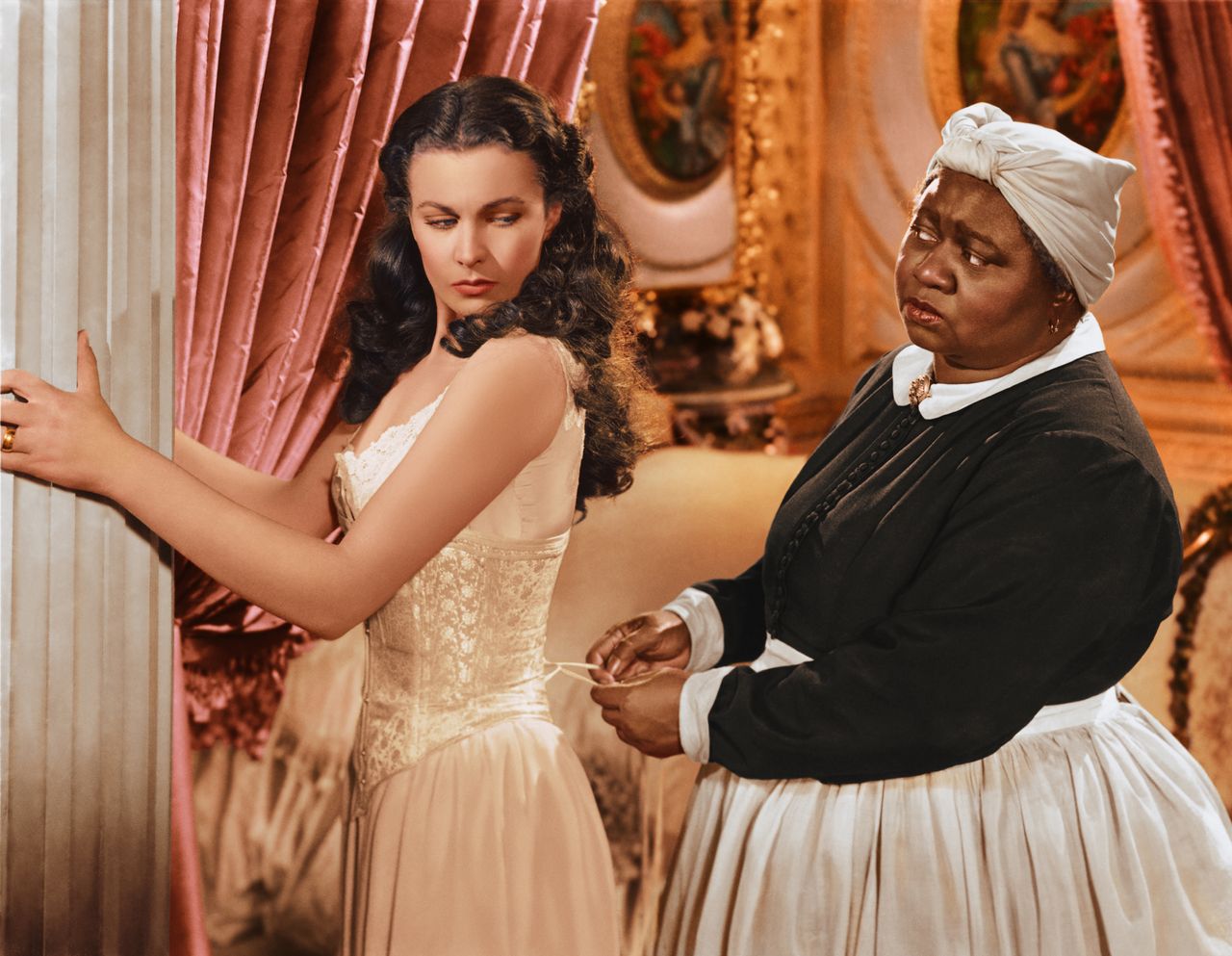Remembering Hattie McDaniel: 75 years since a historic Oscar win
The Gone with the Wind star won a Best Supporting Actress Oscar in 1939 — but didn't inspire much change in Hollywood

Before Lupita Nyong'o and Octavia Spencer, before Mo'Nique and Jennifer Hudson, before Halle Berry and Whoopi Goldberg, there was Hattie McDaniel. Her name comes up, now and again, when Hollywood finds itself at the center of a racial controversy, and with good reason: in 1940, she made history by becoming the first African-American to win an Oscar, for playing Mammy in Gone with the Wind.
McDaniel's victory came at the 12th Academy Awards, which were held in the Coconut Grove at The Ambassador Hotel in Los Angeles. Though the banquet tables lining the room seated her co-stars Clark Gable, Vivien Leigh, and Olivia de Havilland, McDaniel was not allowed to sit in their company. Instead, she and her companion sat at a separate table, to the side, and in the back. She wore white gardenias in her hair, and as she accepted the award for Best Supporting Actress, she said she hoped she would "always be a credit to my race and to the motion picture industry."
It was a long road to the Oscar podium. Born in 1895 in Wichita, Kansas, Hattie McDaniel was the youngest of 13 children born to Henry McDaniel and Susan Holbert — both former slaves. Her family later relocated to Colorado, where her father worked as a preacher and her mother sang in the gospel choir. One of her brothers managed a minstrel show, and it was while working on this show that McDaniel honed her performing talents, becoming an accomplished singer and songwriter.
Subscribe to The Week
Escape your echo chamber. Get the facts behind the news, plus analysis from multiple perspectives.

Sign up for The Week's Free Newsletters
From our morning news briefing to a weekly Good News Newsletter, get the best of The Week delivered directly to your inbox.
From our morning news briefing to a weekly Good News Newsletter, get the best of The Week delivered directly to your inbox.
She went on to achieve some modest success, becoming the first African-American woman to sing on the radio while touring with Professor George Morrison's Melody Hounds, an all-black ensemble, and recording songs for Okeh and Paramount Records before the stock market crash of 1929 forced her into domestic work for several years. She eventually made her way to Los Angeles in 1931, along with her brother Sam and sister Etta, and started her film career a year later at the age of 37.
Between 1931 and 1939, McDaniel appeared in approximately 72 films; the exact number is hard to determine, since many of her roles went uncredited. Those that were include China Seas in 1935 with Clark Gable and Show Boat in 1936, where she stole scenes from Irene Dunne. It was Gable who would later recommend McDaniel to Gone with the Wind producer David O. Selznick. Having already displayed a knack for portraying no-nonsense maids, the part of Mammy was veritably tailored to her talents.
After months of production delays, Gone with the Wind was finally released on Jan. 17, 1940, and immediately became a national and critical smash. When adjusted for inflation, the film remains one of the highest-grossing of all time.
Despite the excitement over the film, McDaniel and the rest of the film's black cast members were barred from attending the film's December premiere in Atlanta due to Jim Crow laws. Clark Gable himself threatened to boycott in support, though McDaniel ultimately convinced him to attend. Just six weeks later, McDaniel beat out her white cast-mate, Olivia de Havilland, for the Oscar.
Sign up for Today's Best Articles in your inbox
A free daily email with the biggest news stories of the day – and the best features from TheWeek.com
McDaniel would go on to appear in over 200 more films, but her roles steadily diminished over time, and she would never again attain the level of success that she reached playing Mammy. Nevertheless, McDaniel achieved more historic milestones in the entertainment industry, even as she continued to play the parts of domestic servants. She returned to radio in 1947, joining The Beulah Show, a daily CBS program, in the titular role of Beulah, a housekeeper and cook; in doing so, she also became the first African-American to star on a network radio show. She would go on to play Beulah as the show transitioned to television, earning script approval and a salary of $1,000 per week. The role was eventually recast as her health declined. McDaniel was diagnosed with breast cancer in 1952.
As her profile rose following her historic Oscar win, McDaniel came under criticism from the NAACP and similar groups for her portrayals of domestic servants. They argued that her performances advanced stereotypes and made it harder for all African-Americans to overcome racism. Though she chaired the Negro Division of the Hollywood Victory Committee during World War II, McDaniel was largely absent from the Civil Rights Movement and did not join the Negro Actors Guild of America until 1947. Both her actions and inactions were part of a larger career plan to avoid controversial politics altogether.
McDaniel regularly answered criticism by saying that she would rather make money by playing a maid than by actually being one. Though she broke new ground for black women in the entertainment business, she played by the established rules of her time, working the system to her advantage rather than using her Oscar win as a chance to dare and defy Hollywood's norms.
Now, 75 years later, there are real questions over how much the industry has changed (if it has changed at all). Several weeks ago, Selma actor David Oyelowo argued, as many argued in McDaniel's time, that black actors receive recognition "more for when [they] are subservient."
It's hard to disagree with him. Following McDaniel's victory, it took 24 years for the Academy to award another statue to an African-American, when Sidney Poitier claimed the Best Actor prize for Lilies of the Field in 1963. His role in the film — Homer Smith, a wandering handyman — is perhaps best described as a Magical Negro, an often fantastical character who acts as a fairy godfather for white protagonists. Of the African-Americans who later won Oscars, few played characters of equal or higher social status than white protagonists.
Many commentators have argued that the snubbing of Selma this nomination season has less to do with the quality of the picture than director Ava DuVernay and Paramount Pictures' failure to play by the rules, produce screeners, and pander for nominations. Where McDaniel went along to get along, DuVernay and Selma will at least have the credit of furthering an important conversation.
Should Hattie McDaniel have used her success to force a conversation? This is a complicated question; the burden of being a racial standard-bearer is not one that should be thrust upon anyone and, pragmatically speaking, McDaniel was smart to avoid standing on a pedestal. She was, however, also a performer of considerable talent, and if there's any sense of disappointment in her career path, it's that she failed to challenge herself to reach even further. While she deserves credit for her many accomplishments, her Oscar stands as both a cultural milestone and the prelude to a career that could have been.
Hattie McDaniel died on October 26, 1952, and is honored with two stars on the Hollywood Walk of Fame. Her Academy Award, left in her will to Howard University, has been missing since the 1960s.
Stephanie is a freelance writer and communication strategist based in New York. Her work focuses on pop culture and the relationship between entertainment and society.
-
 Today's political cartoons - March 30, 2025
Today's political cartoons - March 30, 2025Cartoons Sunday's cartoons - strawberry fields forever, secret files, and more
By The Week US Published
-
 5 hilariously sparse cartoons about further DOGE cuts
5 hilariously sparse cartoons about further DOGE cutsCartoons Artists take on free audits, report cards, and more
By The Week US Published
-
 Following the Tea Horse Road in China
Following the Tea Horse Road in ChinaThe Week Recommends This network of roads and trails served as vital trading routes
By The Week UK Published